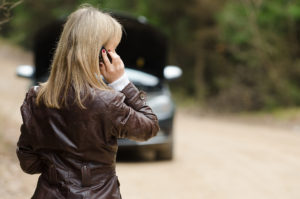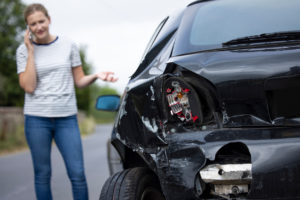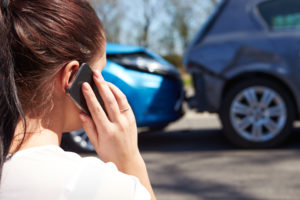 When you are involved in a car accident that involves injuries or property damage, you are required to remain at the accident scene until police arrive. It can be difficult to know if your car has damage until you take it to a mechanic. The car may appear to have a few scratches, but the force of the collision could have caused other damage you cannot see.
When you are involved in a car accident that involves injuries or property damage, you are required to remain at the accident scene until police arrive. It can be difficult to know if your car has damage until you take it to a mechanic. The car may appear to have a few scratches, but the force of the collision could have caused other damage you cannot see.
The same theory applies to injuries. You might feel sore after a car wreck, but otherwise, you “feel okay.” However, the soreness could become chronic pain in the next few days, or you develop other injury symptoms. Until you see a physician, you cannot be sure the car crash did not cause injuries.
Therefore, it is generally best to call 911 to report the car accident and wait for police officers to arrive in every accident.
Why Should You Report a Car Accident to the Police?
 First, you are legally required to report almost all traffic accidents to the authorities.
First, you are legally required to report almost all traffic accidents to the authorities.
However, there are also several benefits of reporting the car accident and having an official accident report:
- The police officer may note that the other driver was responsible for causing the crash, which could make it easier to file an insurance claim
- You have a written record of the crash in case the other driver tries to deny liability
- The information on the accident form can help an attorney with the accident investigation
- The police report may contain the names and contact information of eyewitnesses
The police report is only one piece of an accident investigation, but it is good to have for the reasons above.
For example, in Clearwater, Florida is only legally required in the event of an injury or death. Also, if the damages are over $500 you are not required to inform the police but you are required to submit an accident report, if it’s below $500 you are not required to file a report or involve law enforcement. As you can see the laws may vary depending on the state, this only applies if you were involved in a car accident in Clearwater, FL.
Why Would a Driver Avoid Reporting a Car Accident?
Another driver may ask to pay for the damage out of their pocket instead of reporting the crash to their insurance company.
There could be several reasons for this offer:
- The other driver does not have insurance coverage
- The driver does not have a valid driver’s license
- The person has outstanding warrants, so they do not want the police involved
- The person may be driving someone else’s vehicle
- The driver could be under the influence of drugs or alcohol
You should always report an accident, even if another driver does not want to call law enforcement to the scene. If you agree to handle the matter between yourselves, the other driver could disappear. Likewise, the information he gives you at the accident scene may not be valid.
What Should You Do if the Other Driver Does Not Want to Report a Car Accident?
 Remain at the accident scene and call 911 to report the crash. Try to get the vehicle’s tag number in case the driver tries to leave. If the driver leaves, notify the emergency operator that you were involved in a hit-and-run accident and provide as many details about the vehicle as possible.
Remain at the accident scene and call 911 to report the crash. Try to get the vehicle’s tag number in case the driver tries to leave. If the driver leaves, notify the emergency operator that you were involved in a hit-and-run accident and provide as many details about the vehicle as possible.
When police officers arrive, describe how the accident occurred. Make sure to tell the officers everything the other driver said before he left the accident scene. The officer will include your statements in the police report.
Do I Have to Pay for Damages Caused by a Hit and Run Driver?
 You can file claims against your no-fault insurance coverage for medical bills and lost wages caused by the car accident. PIP insurance does not require that you prove the other driver caused the accident. However, having a police report should be sufficient to prove you were involved in a car crash.
You can file claims against your no-fault insurance coverage for medical bills and lost wages caused by the car accident. PIP insurance does not require that you prove the other driver caused the accident. However, having a police report should be sufficient to prove you were involved in a car crash.
However, you may also be entitled to compensation under your uninsured motorist coverage. Hit and run accidents are covered by uninsured motorist insurance. You could receive compensation for your:
- Medical bills not covered by no-fault insurance
- Reimbursement for all lost wages
- Disabilities and permanent impairments
- Reduction in future earning potential
- Pain and suffering damages
- Reduced quality of life or loss of enjoyment of life
The compensation you can receive from an uninsured motorist claim is more than you can receive from your PIP insurance coverage.
However, you must prove that the other driver caused the car accident to receive compensation for damages. It could be difficult to prove fault if there are no eyewitnesses or video evidence of the crash.
A personal injury lawyer might be able to help you with your claim. An attorney understands how to investigate hit and run accidents when a driver does not want to report the crash. Having this resource can help you avoid being responsible for the damages and expenses caused by another driver.



